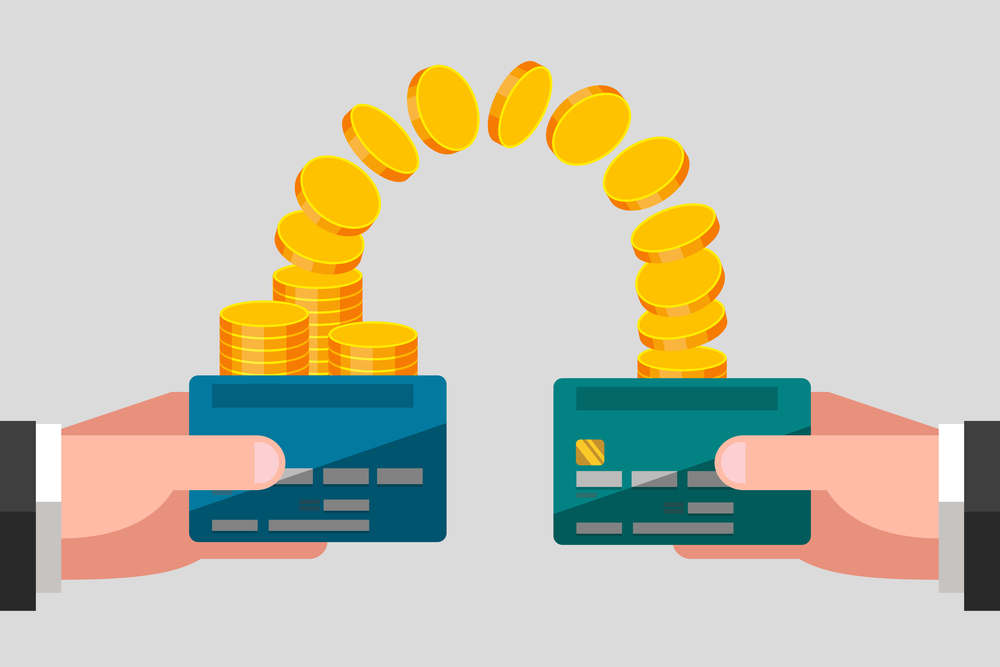
Despite the fact that the popularity of this type of translation is growing every year, there is very little information on the Internet about how they work “from the inside” and in this article I will tell you in simple language what p2p translations are, what they are and how they are arranged .
Card-to-card transfers (aka p2p, card2card, c2c) is a way of transferring money online between individuals using bank card details. To transfer, you must have your bank card (and preferably money on it) and know the card number of the recipient.
You can transfer money from card to card in almost any Internet banking, but if your bank does not have such a function, then you can use third-party services (google “card-to-card transfers”).
Benefits:- There is no need to physically deliver money to the recipient or to the branches of money transfer systems - saving your time;
- Round-the-clock work of services 24x7;
- Fast crediting, in 99% of cases money is credited within 1-2 minutes, but according to the law money can go up to 5 days.
Disadvantages:- A commission is charged for the transfer (on average 1.5% min. 50 rubles, however, some banks do not charge a commission in certain areas, for example,
when transferring between your cards or when transferring from a card of another bank to your own); - Transfers can be tracked (e.g., tax);
- Limits On average, the maximum amount of a one-time transfer is up to 150,000 RUB, per day up to 300,000 RUB, per month up to 1,500,000 RUB;
- There is a possibility (albeit insignificant) that the money may not be credited to the beneficiary's card due to technical problems on the side of the bank and you will be forced to spend time communicating with the bank and searching for your money, this process can drag on and all this time the transfer amount will be unavailable.
Types of P2P transfers
Internal - transfers from a bank card issued by a Russian bank to a bank card issued by a Russian bank.
Cross -
border - transfers from a bank card issued at a Russian bank to a bank card issued at a foreign bank (for example, in Ukraine). Few banks provide such a service, the commission when transferring abroad is usually much higher (on average 2% + 150 RUB and plus currency conversion), and the limits on transfers are lower.
When cross-border transfers, money is debited from your card in rubles, converted at the rate of the international payment system VISA \ Mastercard (as a rule, the IPU rates do not differ much from the Central Bank, you can find out the exact IPS rates using calculators:
Mastercard VISA ) in the currency of the payment system (euro or dollar ), after which another conversion to local currency occurs at the exchange rate of the bank that issued the card to the recipient (here you already lose 0.5% somewhere, but you can and more, it all depends on the greed of the bank). For example, when transferring from a Russian card to a Ukrainian one, there will be two conversions - RUB-> USD \ EUR-> UAH.
It is impossible to make a transfer on Russian services using a sender card issued abroad. It is also impossible to transfer from a Russian card to cards of local payment systems, such as the Belarusian Belkart or the Chinese UnionPay, i.e. the recipient card must be either VISA or Mastercard.
How it works?
To begin, let's look at the participants in the process:
The issuing bank of the card of the sender and the card of the recipient, i.e. the bank that issued the card.
Acquiring bank - a bank that accepts bank card details and processes money transfers - interacts with payment systems, checks for fraud, etc. The issuing bank and the acquiring bank may be the same bank.
Payment system. When we make a transfer from card to card and enter the details of the sender and recipient cards, the acquiring bank does not know what kind of cards these are and which banks they belong to and apply to the PS (because the PS has legal relations with all banks that are members of the PS and all information about which cards which banks were issued).
Also, the PS performs the functions of clearing, and since money actually comes to the bank account only the next day - is a guarantee that the money will definitely come, which allows you to credit money to a physical card. individuals without waiting for the completion of settlements.
PS are international (VISA, Mastercard, etc.) and local (Belkart, Elkart, etc.).
Service Providers (IPSP). Imagine that you are not a very large bank and want to give your customers the opportunity to transfer money from card to card in their own online banking. To do this, you will need:
- Get PCI DSS Certified
- get VISA \ Mastercard licenses
- to refine processing
- develop interfaces, etc.
All this costs quite substantial money, which a small bank will beat off for a very long time on commissions from transfers, and probably will never beat it off. In this case, service providers come to the rescue - these are companies that integrate with acquiring banks, who have all the necessary licenses, who have developed an interface and provide a ready-made service in various formats: API, widget (iframe \ webview), branded mobile application and so on. They provide the service for free, but earn on commission from transfers (SaaS) and part of this commission is given to the site / bank on which the service is located.
The top-level translation process is as follows:

1. The sender enters the details of the transfer (card data, amount, etc.)
2.3. Bank details are transferred to the acquirer bank (either directly or through a service provider)
4. The acquiring bank initiates the transfer by contacting the payment system and forwarding the transfer details to it
5. The payment system determines by the card number the issuing bank of the sender card and sends a transfer request to the bank
6. The issuing bank authorizes - redirects the sender to the 3DS entry page (SMS or push notification with a code)
7. Sender enters verification code
8. The issuing bank of the sender card sends a response to the payment system stating that authorization was successful
9. The payment system sends a request to the issuing bank of the beneficiary's card for crediting funds to the beneficiary's card
10. The issuing bank of the recipient's card credits the money to the beneficiary's bank account
But there is a nuanceWhen you saw the inscription about the successful transfer (and your money was debited, and the recipient was charged), in fact, the money has not gone anywhere, only authorization was successful. The money will go away the next day after at the end of the trading day the PS clears and informs the sender card issuing bank that it needs to send money to the card issuing bank of the recipient, and also issues a separate invoice to pay the commission in favor of the sender. That is why sometimes transfers are delayed, as some banks are waiting for the completion of actual settlements, which occur only the next day.
Bank clearing is an offset, as follows:
- Vasya transferred 200 rubles from Bank “A” to Bank “B”
- Olya transferred 100 rubles from Bank A to Bank B
- Kostya transferred 400 rubles from Bank B to Bank A
Instead of making 3 different transfers during the day, banks wait for the end of the day and make only one in the amount of 100 rubles from Bank “B” to Bank “A”.
Legal artifacts
An offer is an agreement between an individual and an acquiring bank for a p2p transfer. When you make a transfer, you tick off that you agree to the terms of the offer (sometimes it is put down by default). If you have any problems with the transfer, then de jure you need to contact the acquiring bank at the details specified in the offer. De facto, the first thing is better to try to use the technical support contacts of the service in which you made the transfer.
I draw your attention to the fact that if you transfer money, for example, on the website of Bank “A”, then in the offer, especially for small banks and financial services, another bank may be indicated - “B”, and legally you can not submit anything to Bank “A” , since the transfer service was provided to you by Bank “B” in this case.
-161 “On the National Payment System” - this Federal Law, which all acquirer banks must comply with, monitors compliance with this law of the
Central Bank of the Russian Federation . If a bank insulted you as an individual, for example, you made a transfer from one card to another and it did not reach the recipient within 5 calendar days and the money did not return (this is the maximum period for this Federal Law), and the bank refuses to help you in resolving this issue, then you can write a complaint to the Central Bank - this can help.
Payment system rules (
VISA ,
Mastercard ,
MIR ) - all banks issuing cards are members of the PS, and are required to follow the rules of the PS, in case of violation of these rules the bank may receive a large fine. In general, for general development, the rules can be read in order to understand how banks are guided. However, an individual can not appeal to the PS with a complaint about a bank violating the rules, as an individual. persons are not members of the PS. As stated in the movie Pirates of the Caribbean - “The pirate code and our laws are written for us” :)

For what we pay a commission
The fee for p2p transfer consists of:
- PS Commissions - the commission charged by the PS for acting as a link between all banks and clearing. But if the transfer is made between customers of the same bank (or in some cases of the same processing), then the authorization request does not go to the PS and, accordingly, such transfers are free for the bank (but this does not mean that they will be free for customers).
- Acquiring bank commissions - the acquiring bank receives its share from the PS commission for directly providing a transfer service, supporting infrastructure, and so on. Thus, the development of the cashless transfer market is stimulated.
- The commission of the site on which the p2p-translation service is located. If you transfer money, for example, on the conditional site "transfer money.rf" or some small bank that is not an acquirer, then as a rule the site / bank also earn a small percentage on each transfer.
- Commission of the service provider for mediation (if any).
In order to save on commissions, carefully study the services of banks whose cards you use. For example, some banks on your website allow you to transfer from other people's cards to yours for free (thus attracting money to the bank), and using the service of the issuing bank of the card may be more profitable than transferring from your Internet banking.
You can also save on commission by using the Quick Payments System, but this is a topic for a separate article.